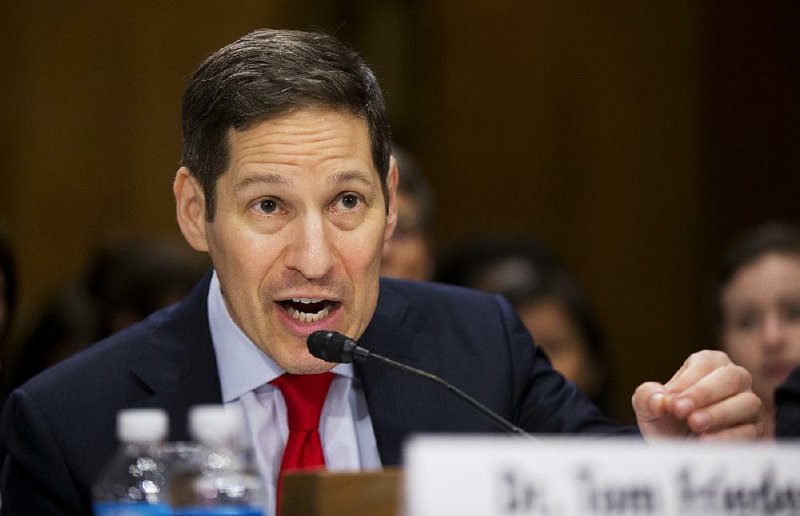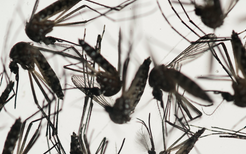WASHINGTON -- The head of the government's fight against the Zika virus said "we are now essentially out of money" and warned that the country is "about to see a bunch of kids born with microcephaly" in the coming months.
Friday's warning from Centers for Disease Control and Prevention Director Thomas Frieden came as lawmakers start to sort out a stopgap government funding bill that is being targeted also to carry long-delayed money to battle Zika.
Zika is spreading more widely in the U.S. and can cause not only microcephaly -- in which babies are born with grave brain defects -- but also other problems that the country will face for decades. And 671 pregnant women in the states and Washington, D.C., have the virus, leading to the births of 17 babies with microcephaly so far.
Frieden said funding delays have slowed long-term studies of the disease and production of new tests for it. "We haven't been able to get a running start" on a long-term battle against Zika, he said.
President Barack Obama in February requested $1.9 billion to fight Zika, but Republicans attached restrictions on any of the money going to affiliates of Planned Parenthood in Puerto Rico. Democrats objected and blocked the $1.1 billion measure.
In the interim, the administration has shifted about $650 million from other accounts to battle Zika, most of it unused money approved two years ago to fight Ebola. That money is almost gone.
Now negotiations are underway to break the impasse over Zika and add it to the only piece of legislation that Congress must pass before the election: a stopgap funding bill to avert a government shutdown Oct. 1.
Democrats and the White House have greater leverage now, since their approval is needed for the stopgap spending bill, and Republicans are signaling they'll likely lift the restrictions on delivering contraception, treatment and care through Planned Parenthood, an organization that many Republicans dislike because it is a major provider of abortion.
A bipartisan consensus is emerging to fund the government through mid-December, though some in the House want a longer duration for the measure to avert a lame-duck session of Congress.
Almost 3,000 people in the continental U.S. have been found to have Zika, and the total is far higher since most people don't display symptoms. The figures in U.S. territories -- including Puerto Rico, mired in a deep economic crisis -- are much worse.
"We are talking about babies that will have problems with hearing disorders, developmental disorders," said Nabal Bracero, who runs a fertility clinic in Puerto Rico. "And now, because of the complexity of Puerto Rico's financial situation, our health system is not ready for that."
So far, 13 dead fetuses belonging to Zika-infected mothers have been identified. Several of them presented signs of brain damage, and one was sent to the CDC in Atlanta to be analyzed, according to Health Secretary Ana Rius.
It is unclear whether the 13 cases involved miscarriages or abortions. Jillian Oliveras, a spokesman for Puerto Rico's Health Department, said no further information would be released because of privacy laws.
Puerto Rico faces a nearly $70 billion public debt it is seeking to restructure. Government officials have warned there is barely enough money to keep providing essential services such as education, health and public safety.
The island's Health Department is identifying how many medical specialists there are and where they are as it prepares for a surge in cases, said Miguel Valencia Prado, director of the department's Children with Special Medical Needs Division.
The cost to treat a microcephaly case throughout a lifetime could range from $3.8 million to $10 million, depending on the severity of the case, he said, adding that he was concerned given Puerto Rico's financial situation plus other limits as a result of being a U.S. territory.
"We cannot expand many services given a cap on Medicaid," he said, referring to a U.S. law that limits the amount of federal funding Puerto Rico receives. "We have to figure out how to make this work."
Frustration is mounting from lawmakers representing affected areas.
"Look, if we don't [act], then fire all of us," said Rep. David Jolly, R-Fla., whose state is bearing the brunt of the disease in the continental U.S. "If we can't get Zika funding by the end of September, then we're nothing but a bunch of idiots up here."
Frieden noted that it is extremely unusual to have a new cause for a severe birth defect, and that infants are having problems swallowing and with their vision and hearing.
"We don't know what congenital Zika syndrome will look like," Frieden said. "We will likely be dealing with this for decades to come."
Information for this article was contributed by Andrew Taylor and Danica Coto of The Associated Press.
A Section on 09/10/2016

